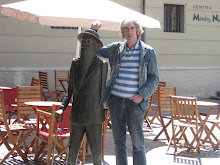The law that ensures at least half of school subjects are taught in Galician is now being opposed by the main Spanish opposition party. The PP is accused of a volte face. In 1997, a similar law was brought in regarding the use of Catalan (Mallorquin) in the Balearics. The PP now argue that there is a difference because in Galicia its "at least 50% of classes" (in Galician)", while in the Balearics its "up to 50% of classes" (in Catalan).
In Catalonia the law stipulates that lessons should be conducted in Catalan at all levels with the obvious exceptions of foreign languages and Spanish language and literature.
The situation in the Valencian Community is that Valencian-Catalan is compulsory in 75% of councils and is a " voluntary or compulsory" subject in the remaining 25%. However, my belief is that Valencian-Catalan is treated as a subject on its own and that the majority of classes are carried out in Castillian Spanish but I need to verify this.
In the Basque Country and Navarre things are more complicated. The Basque education law of 1993 noted the need for students to obtain a minimum level in both written and oral Basque and Spanish. But there are four models to choose from:
A. A predominately Spanish education but with some compulsory Basque.
B. Mixed system with a balance between the two languages.
D.* A mainly Basque education with Spanish as a separate subject (similar to the Catalan model).
The situation Navarre is similar to the above but there is also the G-model of Spanish only with no Basque. This is available in the non-Basque speaking areas of South-West Navarre.
*No "C system" as the letter does not exist in Basque!
Info from La Voz de Galicia, 5th July, 2007.
Subscribe to:
Post Comments (Atom)

2 comments:
Hello..
According to the law what is the benefits of doing this, as law is being opposed by the Spanish opposition party to hold. By these laws i think the education becomes more tough for the students to learn.. Get rid from these types of laws if not beneficial in any sense... What are the advantages of taught half of the subjects in Galician language? Is it necessary to do that??
Thanks
university of barcelona
Hi Komal,
Thanks for your comment and sorry I've taken so long to reply as I didn't realise it was here.
Depends what you mean by necessary. Of course, there are different possibilities. As you can see in the post different autonomus communities handle the linguistic situation in different ways.
I'm not sure if a 50/50 share is ideal in a practical teaching context but it is an attempt to treat both languages equally. Here are some reasons why I think Galician deserves a significant role in the education system:
1.It is the native language of a significant number of Galicians (especially outside the major cities and remember Galicia is still quite a rural society). The advantage of having some of your education in your native language goes without saying.
2.Galician has spent a long time playing second fiddle to a powerful international language (Spanish) which continues to gain ground in many areas (especially the bigger cities). In theory, if the younger generations are able to speak Galician it should help secure the future of the language.
3.Some people argue that Galician is not useful outside of Galicia and for that reason it is a waste of time and you are better off focussing on Spanish. However, that’s not the case as knowing Galician opens the window to the Portuguese-speaking world and allows for easy communication in neighbouring Portugal, with Brazilians, etc. Besides, languages are always useful in their home territories.
4. Whether it confuses some confusion is open to debate but by the time they leave school young Galicians should be fluent in both languages. Evidence shows that being bilingual at an early stage helps you to learn a third language more successfully.
Post a Comment